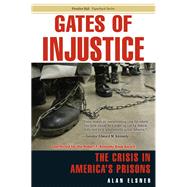
Note: Supplemental materials are not guaranteed with Rental or Used book purchases.
Purchase Benefits
Looking to rent a book? Rent Gates of Injustice The Crisis in America's Prisons [ISBN: 9780131881792] for the semester, quarter, and short term or search our site for other textbooks by Elsner, Alan. Renting a textbook can save you up to 90% from the cost of buying.
Alan Elsner has written extensively about conditions in jails and prisons, visiting institutions in a dozen states to meet with inmates, lawyers, corrections officers, medical staff, religious volunteers, family members, and law enforcement. He has 25 years’ experience in journalism, covering stories ranging from the September 11, 2001 attacks on America and the Arab-Israeli conflict to the 2000 presidential election and the end of the Cold War. Elsner is currently National Correspondent for Reuters news agency. For more information, visit www.AlanElsner.com.
| Preface to the Second Edition | xi | ||||
| Preface to the First Edition | xiii | ||||
| Acknowledgments | xvii | ||||
|
1 | (10) | |||
|
11 | (20) | |||
|
31 | (32) | |||
|
63 | (18) | |||
|
81 | (22) | |||
|
103 | (28) | |||
|
131 | (22) | |||
|
153 | (28) | |||
|
181 | (20) | |||
|
201 | (18) | |||
|
219 | (12) | |||
|
231 | (12) | |||
| Endnotes | 243 | (22) | |||
| Index | 265 |
The New copy of this book will include any supplemental materials advertised. Please check the title of the book to determine if it should include any access cards, study guides, lab manuals, CDs, etc.
The Used, Rental and eBook copies of this book are not guaranteed to include any supplemental materials. Typically, only the book itself is included. This is true even if the title states it includes any access cards, study guides, lab manuals, CDs, etc.